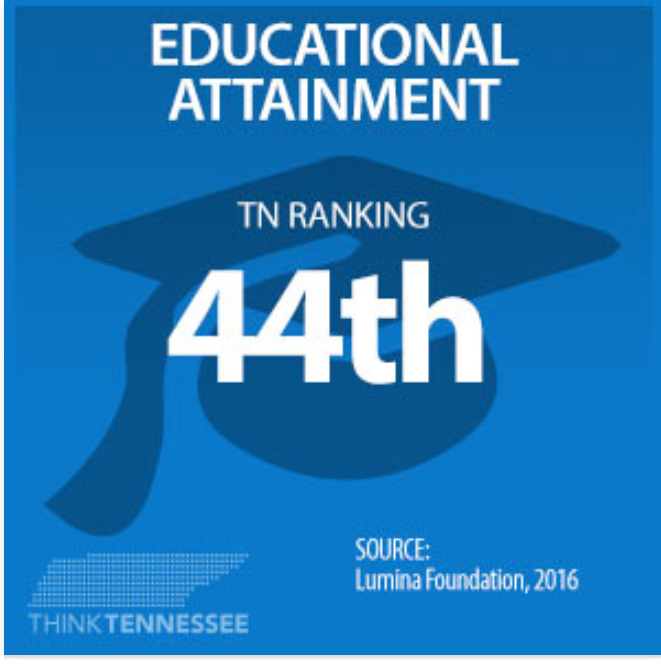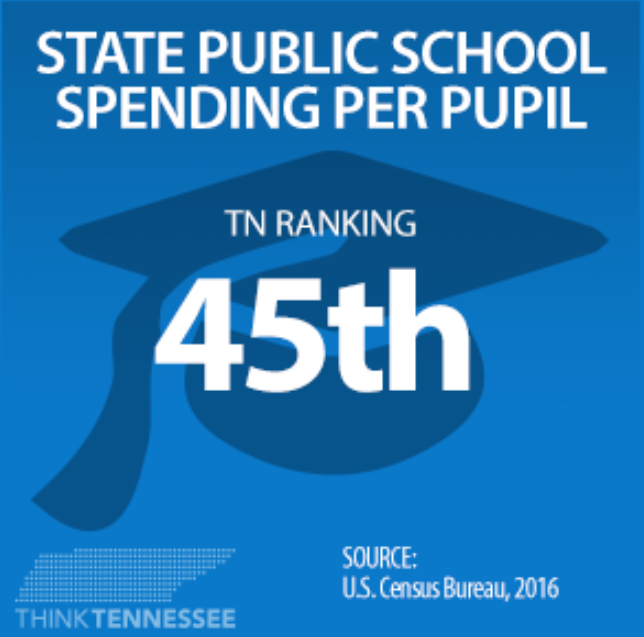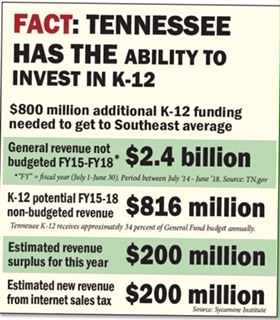This story about retailers attempting to be “good citizens” by offering discounts to teachers actually highlights two larger problems: We don’t adequately fund our schools AND we don’t pay teachers what they deserve.
We already know there’s a significant teacher pay gap across the country. That gap is particularly troubling in Tennessee — a state with a teacher pay gap above the national average. In fact, Tennessee has one of the worst teacher pay gaps in the Southeast. Teachers in Tennessee earn 27.3% less than their similarly-educated peers. Not only that, teacher pay in Tennessee is growing at a rate well below the national average:
Average teacher salaries in the United States improved by about 4% from the Haslam Promise until this year. Average teacher salaries in Tennessee improved by just under 2% over the same time period. So, since Bill Haslam promised teachers we’d be the fastest improving in teacher pay, we’ve actually been improving at a rate that’s half the national average. No, we’re not the slowest improving state in teacher pay, but we’re also not even improving at the average rate.
Then, there’s the issue of basic supplies for learning. Here’s the promotion that got the attention of the writer:
Target wants to help teachers stretch their back-to-school dollars on more than just supplies for their classrooms.
For the second year, the Minneapolis-based retailer will offer teachers a weeklong 15% discount on select items starting July 13, officials shared exclusively with USA TODAY Wednesday…
This year, in addition to school supplies and essentials, which include disinfecting wipes and food storage bags, adult clothing and accessories, Pillowfort furniture and Bullseye’s Playground items also are included.
Here’s the bottom line: School systems should just buy the damn supplies. School administrators should find out what teachers need — the basics, yes, paper, pencils, etc. And also find out what else is needed to run an excellent classroom at all levels and then forward that request to the school system.
Lots of these items could be found at reasonable prices due to bulk purchasing discounts. Moreover, it’s important to have a clear understanding of what it takes to run a classroom and a school.
Not once in the 20+ years that I’ve worked professionally have I been asked to purchase and bring in the supplies I need to do my job. But we ask that of teachers ALL THE TIME.
Stop it. As the writer says:
Stores that have “back to school” sales so parents can buy all those necessary supplies that (usually elementary) teachers post on their classrooms doors or windows? Nope. If public education is a public good, then the schools should provide the necessary supplies.
Is public education a public good in Tennessee? Our Constitution says so:
Article XI, Section 12 of the Tennessee Constitution says, “The General Assembly shall provide for the maintenance, support and eligibility standards of a system of free public schools.”
That obligation was reinforced in the 1993 Tennessee Supreme Court decision in Small Schools v. McWherter:
“The constitution imposes upon the General Assembly the obligation to maintain and support a system of free public schools that affords substantially equal educational opportunities to all students.”
Simply put, Governor Lee and the General Assembly are not living up to this obligation. According to the Comptroller of the Treasury, we under-fund schools by at least $500 million.
We routinely ask underpaid teachers to fill in the gaps when it comes to supplies. And we applaud the businesses who offer discount promotions to teachers or back-to-school sales as if they are actually doing something. If they wanted real change, those business leaders would be at school board and county commission meetings asking for the needed revenue to fund schools adequately. Then, they’d go to the General Assembly — to the very politicians their businesses bankroll – and pursue policy change that resulted in excellent teacher pay and fully-funded schools.
Too often, though, those same businesses beg the state for tax incentives — enriching themselves at public expense while true public goods like education suffer.
Our state needs leaders who will call this out — leaders not beholden to the private entities who want your tax dollars to boost their profits. Our public schools are a priority in our state Constitution. They should be a priority for our political leaders as well.

For more on education politics and policy in Tennessee, follow @TNEdReport
Your investment of $3, $5, or $7 makes reporting education news possible.







